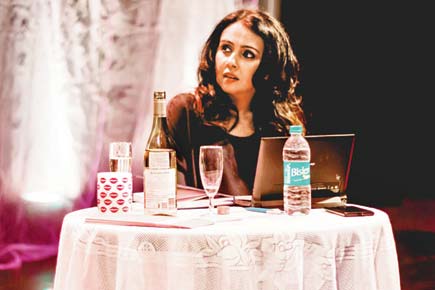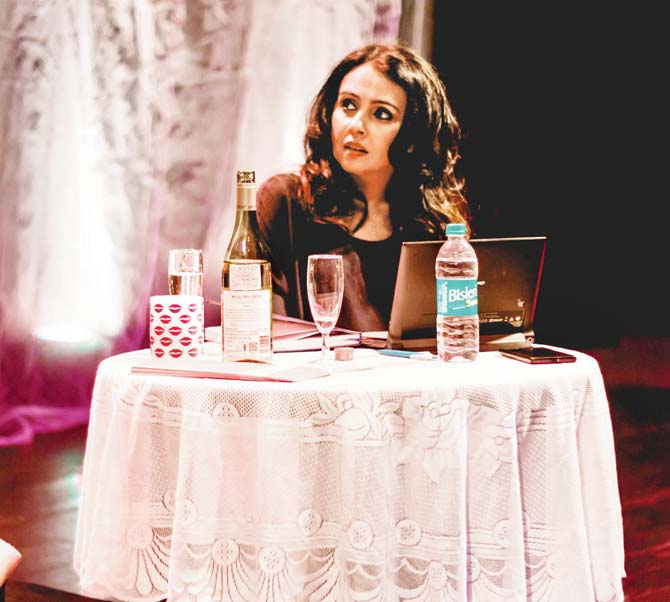Two plays with varied takes on women — in one, Sakubai is defined by inner strength, in the other, Suchi defines the story’s title, Drama Queen


Suchitra Krishnamoorthi in Ashvin Gidwani’s play, Drama Queen
 Saku and Suchi — two plays watched recently, both one-woman shows, with two women from diametrically opposite segments of society — one is a poor domestic help, the other a wealthy divorcee. It is interesting to see the contrast in their dreams, aspirations and attitudes to life.
Saku and Suchi — two plays watched recently, both one-woman shows, with two women from diametrically opposite segments of society — one is a poor domestic help, the other a wealthy divorcee. It is interesting to see the contrast in their dreams, aspirations and attitudes to life.
Nadira Zaheer Babbar’s Ekjute is celebrating its 35th anniversary, and the festival opened with her nearly two-decade old production of Sakubai, starring stage diva Sarita Joshi — in her seventies now, but as energetic as ever, eyes twinkling, feet moving with practiced grace. Nadira Babbar wrote the play at a time when she was despairing of getting good, original productions in Hindi. So she picked up a pen and started writing herself, inspiration for this one coming from the ubiquitous presence in almost every Mumbai household — the nine-yard sari clad Maharashtrian maid.
Now they are spiffily dressed in synthetic saris and have a basic education, but Sakubai came from an earlier era, brought over to the city along with her mother, by her uncles, to help beat poverty back home in the village and help raise younger siblings. At a young age, she is put to work in homes — sweeping, swabbing, scrubbing vessels, washing clothes and cooking. These honest, hardworking women can be trusted with keys, and do their work often in the absence of their employers.
When the play opens, Sakubai comes in to work in the rain, and as she clears the messy house, talks about her life — the displacement from home, the back-breaking work, the squalid existence in Mumbai, the traumatic rape by her uncle that gets her evicted from the house, her marriage to a decent man, the birth of her daughter. With consistent good cheer, she lampoons the foibles of her rich employers, but is unwaveringly reliable — at one point preventing the theft of her memsaab’s diamond ring. This Sakubai is luckier than others of her ilk, who invariably have unemployed alcoholic husbands who beat them. She accepts her fate with equanimity and does what she can to better her own life and that of her daughter. She has a lot to complain about, but she is not a whiner. Mumbai’s wheels run a little more smoothly thanks to the thousands of Sakubais, who are seldom given the credit due to them.
Suchitra Krishnamoorthi playing herself in the Ashvin Gidwani play, Drama Queen, directed by Inaayat Ali Sami, has a litany of woes. She is divorced from her husband (Shekhar Kapur), single mother to Kaveree, and needs a shrink to help her cope with her multiple phobias.
To add to her misery, her mother (voiced by Sujata Kumar) nags her relentlessly to marry a nice boy from the community.
Suchitra has turned her own life into a comedy, which first came out as a book, and has been turned into a play with the same title. She holds forth on her own, with other characters being heard, not seen. It takes courage to do a show like that, and put oneself up for ridicule, but she does the play with total abandon and an admirable lack of inhibition.
Many women in the audience would relate to her problems — not money or lack of friends, but a certain kind of loneliness that some women feel when they find themselves single.
She wants to get married to a nice man who would look after her, but mainly for sex. She has a married man dropping by to play scrabble and occasionally proposition her, but she wants the security of marriage.
She looks at single men within the film industry and reveals their rejection with a crazy sense of candour. Ram Gopal Varma is so spooked by this “psycho chick” stalking him, that he surrounds his office with security. Others like Karan Johar, Nagesh Kukunoor and Ken Ghosh have equally hilarious responses to her marriage proposals.
It’s all very entertaining in a Bridget Jones-ish way, this desperate quest for a man, while trying to hang on to instilled values and a semblance of self-respect. Bridget Jones did a world of damage to the image of single women the world over. It gave the impression that all women want in order to be happy and fulfilled is a man.
Suchitra’s play also seems to say that no matter how well-off or accomplished a woman may be (she is an actress, singer, painter and writer, which is a remarkable amount of talent vested in one person), she is not complete without a husband by her side. And a woman without a man must be a figure of ridicule, not just to society, but even to herself. While the man so unencumbered — RGV, for example — feels no such void in his life. Life, says this drama queen, ain’t fair, which is true, but perhaps that bout of sympathy is best saved for Sakubai, who has no choice and no power to change the lousy hand that life dealt to her.
Deepa Gahlot is an award-winning film and theatre critic and an arts administrator. She tweets @deepagahlot. Send your feedback to mailbag@mid-day.com
 Subscribe today by clicking the link and stay updated with the latest news!" Click here!
Subscribe today by clicking the link and stay updated with the latest news!" Click here!







